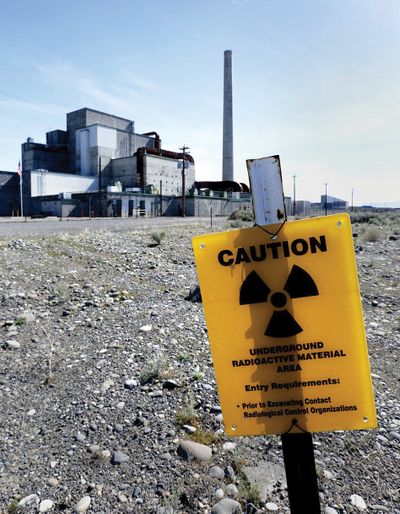Who is keeping radioactive waste at Hanford safe during the guard lockout?

A federal mediator has been called in as the Hanford Guards Union Local 21 and Hanford Mission Integration Solutions have agreed to return to the bargaining table Monday, Dec. 2.
The Hanford nuclear site guards were locked out starting at 5:30 a.m. Wednesday as their third contract extension expired on a three-year contract originally good through Nov. 1.
The union members rejected what Department of Energy contractor HMIS said was its best and final offer, and HMIS rejected a proposal for a 10-day contract extension, but agreed to a five-day extension until Wednesday morning.
Members of the union picketed in the fog along George Washington Way in Richland.
HMIS said Wednesday that the workers on site starting Wednesday morning to provide safety and security are exempt Department of Energy certified security police officers and security officers.
They include workers brought in from other sites, Hanford Patrol members who are salaried and not covered by the union, and former Hanford Patrol members.
About two-thirds of patrol are bargaining unit security police officers who are unable to report to work until a new agreement is reached with the Hanford Guards Union, HMIS said.
The remaining third are Hanford salaried staff officers. They include first line supervisors, staff planners, training officers and others up through the chief of Hanford Patrol, who are DOE qualified and commissioned security police officers.
It is common practice for them to fill in for union security police officers when overtime positions are not filled by workers covered by the union, HMIS said.
The Hanford Patrol, an armed protective force, provides security for the 580-square-mile site adjacent to Richland. Duties include protecting radioactive materials and classified materials, providing active shooter response, and deterring and responding to radiological and toxicological sabotage events by terrorists or others.
The Hanford site produced plutonium for the nation’s nuclear weapons program from World War II through the Cold War. It still has radioactive materials and contamination as environmental cleanup continues.
The patrol also staffs secure entrances to the site and aids the Hanford Fire Department, including controlling accident scenes and providing first response services in medical emergencies until fire department staff arrive.
The number of Hanford guards is not made public for security reasons.
The union is negotiating for better pay, given the sharp rise in inflation since the last contract was approved and the high security clearance, coupled with ongoing monitoring of their travel and personal spending, they are required to have, said Chris Hall, president of the Hanford Guards Union.
They also want other issues addressed, such as language in its contract covering medical autonomy after a COVID vaccine mandate during the pandemic and open arbitrations that HMIS is dragging its feet on, Hall said.
The union has spent record amounts of money on attorney fees under its just expired contract because it believes HMIS has repeatedly violated the contract, he said.
Both Hall and HMIS said their goal was to get Hanford Patrol guards back to work as quickly as possible.
But union members voted against the latest HMIS proposal “because it is unacceptable. We can’t continue to work under the conditions and wages that they have,” Hall said.
HMIS said that “ensuring the safety and security of Hanford is our number one priority, and we will continue to ensure that national security interests are protected, and that Hanford operations continue to be safe and secure while we continue to negotiate a new collective bargaining agreement with the Hanford Guards Union.”